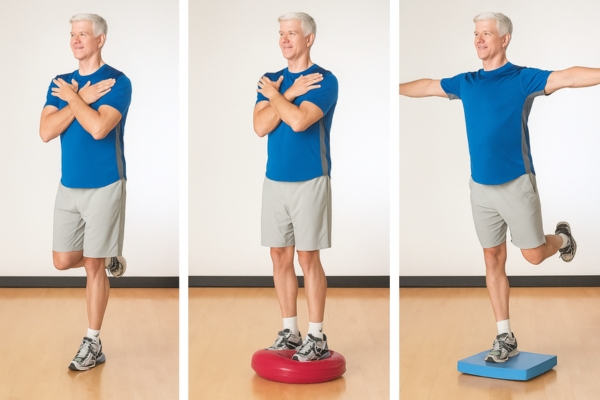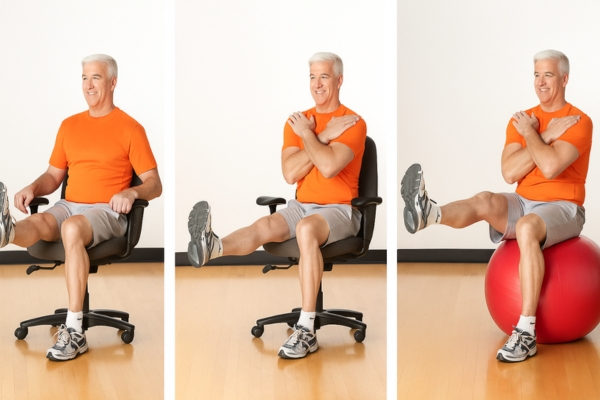Table of Content
- Introduction
- Why Fall Risk Increases With Age
- The Role of Physiotherapy in Preventing Falls
- How Falls and Balance Training Helps Seniors
- Best Exercises to Improve Balance for Older Adults
- How Often Should Seniors Do Balance Training?
- Safety Tips Before Starting Any Balance Exercises
- Role of Aged Care Fall Prevention Programs in Australia
- Choosing an Accredited Physiotherapist for Seniors
- Common Mistakes That Increase Fall Risk
- How Go Run Go Physio Supports Elderly Fall Prevention
- Frequently Asked Questions
- Conclusion
Introduction
As we grow older, maintaining independence becomes closely tied to staying physically steady and confident. One of the most effective ways to support older adults in this journey is through targeted Falls and Balance Training. Whether it’s a simple walk around the garden or moving from sitting to standing, balance plays a crucial role in daily life and poor balance significantly raises the risk of falls. Fortunately, physiotherapist-guided training programs have shown real benefits in helping older adults improve stability, regain confidence, and reduce injuries.
Why Fall Risk Increases With Age
Falls are not just a natural part of ageing they often happen due to modifiable risk factors. The likelihood of a fall increases due to:
- Declining muscle strength
- Poor coordination
- Inner ear or vestibular issues
- Impaired vision
- Medication side effects
- Neurological conditions(e.g., Parkinson’s or stroke recovery)
- Fear of falling (which can lead to reduced activity and further decline)
Falls can lead to serious consequences like hip fractures, head injuries, and loss of independence. That’s why preventing falls in older adults must be treated as a priority in community and home care.
The Role of Physiotherapy in Preventing Falls
Physiotherapists play a vital role in helping seniors stay safe. An accredited physiotherapist for seniors in Australia understands age-related movement changes and can create personalised programs aimed at improving mobility and strength.
Benefits of physiotherapy-guided balance programs include:
- Restoring leg and core strength
- Improving posture and gait
- Enhancing flexibility and joint function
- Training seniors to correct their balance in real time
- Reducing reliance on mobility aids
These outcomes are only achievable through ongoing practice and professional supervision, especially when balance is already compromised.
How Falls and Balance Training Helps Seniors
Balance training is more than just a set of movements. It’s a proven strategy that focuses on:
- Re-training body awareness and control
- Encouraging safe movement strategies
- Building muscle memory through repetitive patterns
- Improving neuromuscular responses
With a consistent aged care fall prevention program, seniors can experience noticeable improvements in confidence and mobility in as little as a few weeks.
Best Exercises to Improve Balance for Older Adults

Below are physiotherapist-recommended exercises to improve balance in elderly individuals. These should ideally be performed under supervision until the person feels confident doing them safely alone.
Seated Marching
Goal: Improves hip mobility and leg strength
- Sit on a sturdy chair
- Lift one knee towards your chest
- Lower and repeat on the other side
- Do 10–15 reps per leg
Heel-to-Toe Walk
Goal: Enhances gait and coordination
- Stand near a wall or counter for support
- Place one foot directly in front of the other, heel touching toe
- Walk in a straight line for 10 steps
- Repeat 2–3 rounds
Single-Leg Stance
Goal: Strengthens stabilising muscles
- Stand on one leg for up to 10 seconds
- Switch legs
- Do 5 reps on each leg
- Hold onto a bench or rail if needed
Sit-to-Stand Practice
Goal: Builds lower body strength and balance
- Sit in a sturdy chair
- Stand up slowly without using hands if possible
- Lower back down gently
- Repeat 10 times
Tai Chi-Inspired Moves
Goal: Improves coordination and posture
- Simple slow-motion movements like side steps, arm circles, and weight shifting
- Helps with full-body balance and calm concentration
How Often Should Seniors Do Balance Training?
For noticeable improvements:
- Frequency: 3–5 times per week
- Duration: 20–30 minutes per session
- Progression: Gradually increase difficulty with guidance from a physiotherapist
Including these exercises as part of a routine, along with walking and light resistance training, yields the best outcomes.
Safety Tips Before Starting Any Balance Exercises
- Wear proper shoes with non-slip soles
- Use support rails or chairs when starting out
- Avoid distractions like pets or clutter in the area
- Never push through pain stop if there’s discomfort
- Hydrate before and after any session
Physiotherapist supervision is strongly recommended, especially for beginners or those with a history of falls.
Role of Aged Care Fall Prevention Programs in Australia
An effective aged care fall prevention program combines:
- Individual assessments
- Supervised strength and balance training
- Environmental safety checks
- Ongoing support and check-ins
- Education for families and carers
Australian aged care standards support fall prevention initiatives, especially in residential and in-home care services. The key is early intervention before a serious incident occurs.
Choosing an Accredited Physiotherapist for Seniors
Not all health professionals are trained in senior fall prevention. Look for:
- Registration with the Australian Health Practitioner Regulation Agency (AHPRA)
- Specific experience in Falls and Balance Training
- Home visit services if mobility is limited
- Customised exercise plans with ongoing review
Go Run Go Physio specialises in delivering these exact services, helping seniors stay active, independent, and fall-free.
Common Mistakes That Increase Fall Risk
Awareness of avoidable habits helps prevent injury:
- Skipping regular physical activity
- Poor lighting at home
- Using incorrect walking aids
- Wearing loose clothing or inappropriate footwear
- Ignoring minor balance issues
Prevention starts by making the right adjustments early on.
How Go Run Go Physio Supports Elderly Fall Prevention
At Go Run Go Physio, we understand that every senior has different needs. Our physiotherapists:
- Offer tailored Falls and Balance Training programs
- Visit clients at home or aged care facilities
- Provide structured follow-ups
- Work collaboratively with GPs and carers
- Support seniors with practical advice, not just theory
Whether you’re recovering from a fall or taking proactive steps to stay steady, our team is ready to support your journey.
Frequently Asked Questions
Q1. What is the best way to prevent falls in older adults?
Answer: The most effective way to prevent falls in seniors is through regular Falls and Balance Training guided by qualified professionals. At Go Run Go Physio, we design programs that target strength, coordination, and confidence helping reduce the risk of falls at home or in aged care settings.
Q2. Can balance exercises for seniors really reduce fall risk?
Answer: Yes, research shows that consistent balance-focused routines improve stability and lower the risk of injury. Our team at Go Run Go Physio provides physiotherapist-approved exercises that are safe, practical, and tailored to older Australians.
Q3. Are home visits available for fall prevention programs?
Answer: Absolutely. Go Run Go Physio offers home-based aged care fall prevention programs for seniors who prefer to train in their own space. Our mobile physiotherapists provide assessments, safety checks, and one-on-one training sessions.
Q4. What are the top exercises to improve balance in elderly Australians?
Answer: Common balance exercises include single-leg stands, heel-to-toe walking, sit-to-stand drills, and modified Tai Chi movements. At Go Run Go Physio, we guide seniors through the best exercises to improve balance based on their unique needs and mobility levels.
Q5. How does Go Run Go Physio customise fall prevention for seniors?
Answer: Every senior has different needs, so at Go Run Go Physio, we start with a detailed physiotherapy assessment before designing your personalised fall prevention plan. We factor in medical history, mobility challenges, and home environment to deliver real results safely and confidently.
Conclusion
Falls are preventable, not inevitable. With proper support, seniors can maintain independence, avoid injury, and enjoy a more active lifestyle. A personalised Falls and Balance Training program guided by experienced physiotherapists can make all the difference.
Go Run Go Physio is committed to helping older Australians move confidently with care that’s built around their needs. Start with small steps today for a safer tomorrow.

